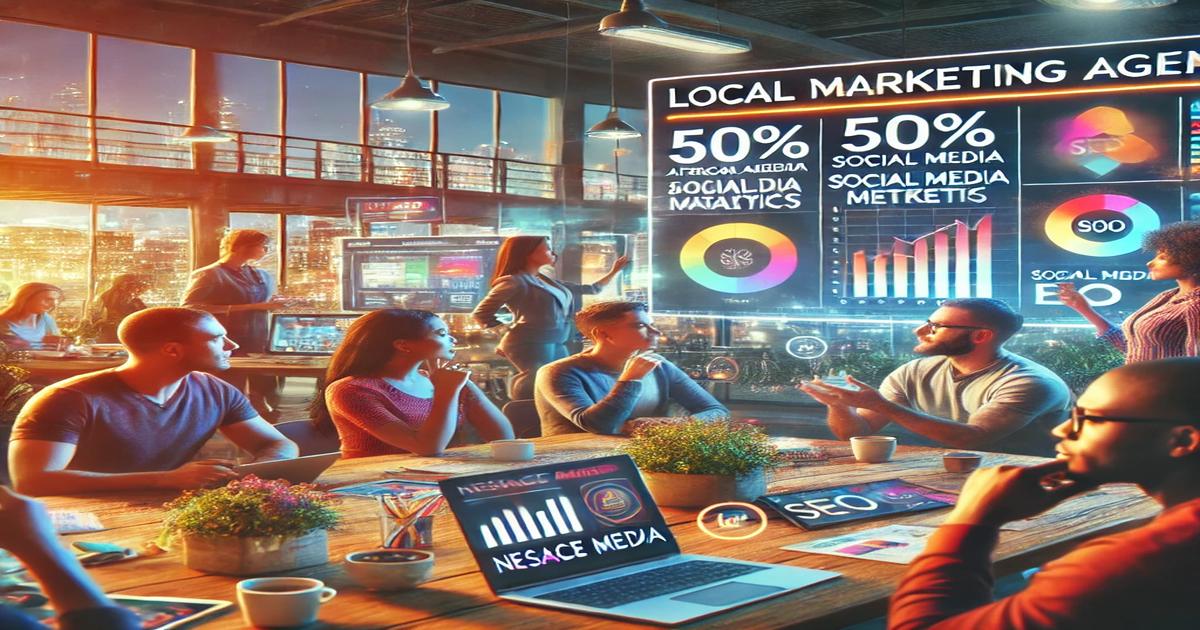Finding the right marketing agency near me is crucial for businesses looking to thrive in today’s competitive digital landscape. With countless agencies claiming to offer the best services, making the right choice requires careful evaluation and understanding of what makes an agency truly exceptional. Whether you’re a small business or a large corporation, aligning with the right partner can make or break your digital success.
Understanding the Value of a Local Marketing Agency
When searching for expert marketing support, working with a digital marketing agency in your area brings unique advantages that remote agencies simply can’t match. Local agencies understand your market, community, and target audience on a deeper level. They provide more personalized service, which can be incredibly advantageous in fine-tuning marketing strategies that resonate with your target audience.
Benefits of Working with Local Marketing Experts
Local marketing agencies offer several distinct advantages:
- Face-to-face meetings for better strategy alignment – Nothing beats face-to-face interaction when developing long-term strategies. Personal meetings help foster trust and provide more clarity in communications.
- Deep understanding of local market dynamics – Agencies that are rooted in the community understand local market fluctuations, seasonal trends, and the economic climate, allowing for more effective targeting.
- Quick response times for urgent needs – Need to launch an impromptu campaign? A local agency can act swiftly without the lag time that remote collaborations often experience.
- Intimate knowledge of regional competitors – Knowing the competition in your immediate area is invaluable for carving out a niche in your local market.
- Strong local business network connections – A local marketing agency can leverage its community connections to benefit your business through partnerships, events, and local sponsorship opportunities.
- Understanding of local consumer behavior – Demographics can vary drastically from one region to another. Local agencies have the insights needed to tailor campaigns to fit your specific audience.
- Ability to attend local events and networking – With local agencies, you can count on their physical presence at events like trade shows, conferences, or community events, promoting a deeper connection to the market.
- Knowledge of regional regulations and practices – Staying compliant with local advertising rules and practices is critical to avoid fines or penalties.
- Cultural alignment with your target market – Local agencies are part of the same culture your customers belong to, making it easier to connect through culturally relevant marketing messages.
- Easy access for emergency consultations – If there’s an urgent need for adjustment, being able to drop in for an immediate meeting can help you pivot your campaigns effectively.
Comprehensive Service Offerings
Modern marketing requires a multi-faceted approach. Gone are the days when businesses could rely solely on print ads or one-off digital tactics. Today’s full-service digital marketing agency should offer a range of services that work in concert to build your brand’s online presence and drive leads. Here’s what to expect from a full-service agency:
| Service Category | Core Features | Business Impact |
|---|---|---|
| Digital Marketing | SEO, PPC, Social Media, Email Marketing | Drives online visibility and leads |
| Content Creation | Blogs, Videos, Graphics, Podcasts | Builds brand authority and engagement |
| Web Development | Design, Maintenance, UX Optimization | Creates strong digital foundation |
| Analytics | Reporting, Data Analysis, KPI Tracking | Ensures ROI and performance |
| Creative Design | Branding, Logo Design, Graphic Services | Establishes a compelling brand image |
By providing a comprehensive suite of services, a local marketing agency can act as your one-stop shop for everything from building a website to ensuring it ranks well in search engines and crafting the content that keeps visitors engaged.
Comprehensive Evaluation Process
Choosing the best marketing agency near you requires more than a quick Google search. Here’s a detailed evaluation process to help guide your decision-making.
Initial Research Phase
Before contacting agencies, conduct thorough research:
- Check online reviews and testimonials – Past client reviews provide real-world insights into an agency’s effectiveness and client relations.
- Review their client portfolio – A strong portfolio demonstrates experience and competence in delivering results for a variety of businesses.
- Analyze their social media presence – An agency that excels in social media marketing should have a vibrant and engaging social presence themselves.
- Examine their content quality – Review blogs, whitepapers, and other resources they publish. The quality of their content speaks volumes about their expertise.
- Verify business credentials – Ensure the agency is legally established, reputable, and holds any necessary certifications.
- Check industry associations – Membership in industry associations (such as the American Marketing Association) can indicate a commitment to ongoing professional development.
- Review case studies – In-depth case studies can showcase the agency’s problem-solving skills and successful outcomes for clients.
- Assess their website performance – Their website should be a showcase of their skills, particularly if you’re looking for web design or SEO services.
- Look for industry awards – Agencies that win industry accolades or certifications (like Google Partners) typically have a proven track record of success.
- Research team credentials – Check if the agency’s team has the relevant experience and qualifications, especially in your industry.
Portfolio Analysis Techniques
Learning how to effectively analyze an agency’s portfolio can help you ensure they’re the right fit:
- Look for industry-specific experience – Does the agency have experience with businesses like yours?
- Check result metrics and KPIs – Numbers don’t lie. Look for concrete metrics, such as increased website traffic, conversion rates, and ROI.
- Evaluate design quality and consistency – Does the work align with your brand’s visual identity?
- Review content strategy examples – Content is key to many campaigns. Evaluate their approach to topics, tone, and user engagement.
- Assess campaign creativity – Creativity can be a game-changer in crowded industries. Look for out-of-the-box thinking that sets them apart.
- Examine long-term client relationships – Agencies with longstanding clients often deliver strong, sustained results.
- Study problem-solving approaches – Marketing is about adapting to new challenges. Review how the agency has tackled past client issues.
- Review digital innovation examples – An agency that innovates will keep you ahead of industry trends.
- Check multimedia capabilities – In the digital age, it’s important that your agency can produce videos, podcasts, and other multimedia content.
- Analyze branding consistency – The agency should excel at maintaining consistent messaging across all channels.
Digital Presence Assessment
A professional marketing agency should excel in their own marketing. According to industry research, a strong digital presence is a clear sign of expertise. Evaluate how well they practice what they preach.
Website Quality Indicators
A well-designed website speaks volumes about an agency’s attention to detail and professionalism. Ensure the agency’s website displays:
- Mobile responsiveness – Given that over half of all web traffic comes from mobile devices, their site should be fully optimized for mobile use.
- Page load speed – A slow website can drive potential customers away. Evaluate the agency’s load times using tools like Google PageSpeed Insights.
- Clear service descriptions – The agency should clearly list what they offer, how it works, and the benefits to your business.
- Professional design – Their design should be modern, clean, and reflective of industry best practices.
- Easy navigation – You should be able to find what you’re looking for in seconds. A cluttered or confusing navigation system is a red flag.
- Clear calls to action – Look for well-placed buttons or links prompting visitors to take action, like scheduling a consultation or signing up for a newsletter.
- Quality content – Blogs, whitepapers, or case studies show that the agency is invested in educating clients and building authority.
- Regular blog updates – If they offer content marketing services, their own blog should reflect consistency and value.
- Security certificates – Trust is essential in any digital business, and an agency should use SSL certificates to secure client information.
- Contact accessibility – Make sure their contact details are easily accessible, either via a form, phone number, or email link.
Social Media Excellence
Social media is an extension of a company’s brand. Look for the following indicators of success:
- Consistent posting schedule – The agency should be posting regularly, maintaining an active online presence.
- Engaging content mix – Their content should include a blend of promotions, industry news, behind-the-scenes looks, and more.
- Professional branding – Visuals should be on-brand and consistent across all platforms.
- Active community management – Is the agency responding to comments, engaging with followers, and fostering a positive community?
- Cross-platform presence – They should have a presence on the major platforms relevant to your business, such as LinkedIn, Instagram, Facebook, and Twitter.
- Industry thought leadership – Agencies that establish themselves as thought leaders often publish articles or host webinars on the latest trends.
- Case study highlights – Look for agencies that showcase client success stories on their social media pages.
- Team spotlights – A marketing agency that highlights its team members shows that it values transparency and collaboration.
- Client testimonials – Look for positive reviews or client shout-outs on their social channels.
- Event coverage – Agencies that attend or sponsor industry events likely have a strong pulse on the latest trends.
Service Delivery Excellence
The delivery of high-quality services is the backbone of a great marketing agency. It’s essential that they have robust strategies for each digital marketing solution they offer.
Digital Marketing Solutions
Comprehensive digital marketing services should include strategies that cater to various aspects of your business, with measurable results.
Search Engine Optimization (SEO)
The backbone of digital visibility, SEO services should include:
- Technical SEO audits – Ensure your website is optimized from the ground up.
- On-page optimization – Improving meta tags, keyword usage, and content structure for better search rankings.
- Content strategy – Developing high-quality content that not only ranks but also engages visitors.
- Link building – Boosting authority through high-quality inbound links.
- Local SEO – Optimizing for local search results, such as appearing in “near me” searches.
- Mobile optimization – Ensuring a seamless experience on all devices.
- Voice search optimization – Adapting to the growing trend of voice search via smart speakers.
- Schema markup – Structured data to improve how search engines read and rank your content.
- Site speed optimization – Enhancing user experience through fast-loading pages.
- User experience enhancement – Improving design and functionality for better engagement.
Pay-Per-Click (PPC) Advertising
PPC campaigns provide immediate results and require careful planning and execution. A full-service PPC package might include:
- Campaign strategy – Building a customized campaign based on specific goals.
- Keyword research – Identifying high-value keywords for targeting.
- Ad copy creation – Crafting persuasive copy that converts.
- Landing page optimization – Designing pages specifically to capture leads and drive sales.
- Bid management – Maximizing budget efficiency through strategic bidding.
- A/B testing – Continuously testing elements of the ads for optimal performance.
- Conversion tracking – Monitoring key actions such as purchases, sign-ups, or downloads.
- Budget optimization – Ensuring each dollar spent delivers maximum ROI.
- Audience targeting – Refining target demographics to reach the right people.
- Performance analysis – Ongoing reviews to fine-tune the campaign and drive better results.
Social Media Marketing
Social media remains an essential tool for brand awareness and customer engagement. A competent agency will offer services such as:
- Platform strategy – Determining which platforms are best for your business.
- Content calendar – Planning and scheduling posts to maintain consistency.
- Community management – Engaging with your audience to build loyalty.
- Paid advertising – Creating targeted social media ads that convert.
- Influencer collaboration – Working with influencers to amplify your brand.
- Analytics tracking – Regular reporting on key metrics.
- Crisis management – Handling negative feedback or PR issues effectively.
- Brand voice development – Ensuring your social media presence aligns with your brand identity.
- Engagement optimization – Increasing likes, comments, and shares through refined strategies.
- Contest management – Running giveaways or contests to increase engagement.
Strategic Implementation Process
Every successful marketing campaign follows a strategic framework. Here’s a typical breakdown of how agencies implement your marketing plan:
Planning and Execution Framework
| Phase | Activities | Deliverables | Timeline |
|---|---|---|---|
| Discovery | Market research, competitor analysis, goal setting | Strategy document, baseline metrics | Week 1-2 |
| Planning | Campaign structure, resource allocation, timeline creation | Project plan, budget allocation | Week 3-4 |
| Implementation | Content creation, channel setup, optimization | Active campaigns, initial results | Month 2 |
| Optimization | Performance tracking, adjustments, scaling | Performance reports, recommendations | Ongoing |
This process ensures that the agency remains aligned with your business goals and delivers measurable results.
Technology Stack Assessment
Marketing agencies leverage various tools to ensure success across all digital fronts. The following are some essential tools that most top-tier agencies use:
Essential Marketing Tools
- Analytics Platforms
- Google Analytics
- SEMrush
- Ahrefs
- Moz Pro
- HubSpot
- Content Management
- WordPress
- Contentful
- Drupal
- Webflow
- Shopify
- Social Media Management
- Hootsuite
- Buffer
- Sprout Social
- Later
- SocialBee
Having a solid understanding of these tools is crucial when evaluating an agency’s technical capabilities. Ask about the platforms they use and how they integrate them into their strategy to track and optimize your campaigns.
Communication and Reporting
Effective communication is the cornerstone of a successful client-agency relationship. Without it, even the best strategy can fail to deliver results.
Standard Communication Protocols
Before hiring, it’s essential to establish clear communication channels with your agency. This includes setting expectations on how frequently updates will be provided and through what channels. Consider these essential communication practices:
- Weekly status updates
- Monthly performance reviews
- Quarterly strategy sessions
- Real-time issue alerts
- Regular stakeholder meetings
- Project milestone reviews
- Budget tracking reports
- Campaign performance updates
- Team collaboration sessions
- Client feedback loops
Agencies should be proactive in providing these updates, ensuring that you’re always in the loop about the progress of your campaigns and any issues that arise.
Performance Reporting
A professional agency will offer regular reporting to keep you informed on how well your campaigns are performing. Here’s what to expect:
| Report Type | Frequency | Key Metrics | Purpose |
|---|---|---|---|
| Campaign Performance | Weekly | Click-through rates, conversions | Tactical adjustments |
| ROI Analysis | Monthly | Revenue, cost per acquisition | Strategic decisions |
| Strategic Review | Quarterly | Goal achievement, market position | Long-term planning |
Transparent and consistent reporting is essential for understanding the value your agency provides, as well as identifying opportunities for optimization.
Industry-Specific Considerations
Different industries have unique marketing needs, and the right agency should be familiar with your sector. Understanding industry-specific challenges and tailoring strategies accordingly ensures that the campaigns resonate with your target audience.
E-commerce
E-commerce businesses need to focus on driving traffic and improving conversion rates. A specialized approach may include:
- Shopping feed optimization – Ensure your products appear prominently on shopping platforms like Google Shopping.
- Cart abandonment strategies – Retarget users who have abandoned their carts with incentives or reminders.
- Product listing ads – Utilize ads that showcase specific products to potential buyers.
- Conversion rate optimization – Fine-tune your website and checkout process to reduce friction and improve sales.
- Customer journey mapping – Identify pain points along the buyer’s journey to optimize the user experience.
B2B Services
For B2B companies, lead generation and relationship building are the cornerstones of successful marketing. A capable agency should be able to implement:
- Lead generation – Create funnels that attract qualified leads and drive conversions.
- Account-based marketing – Tailor your outreach to key accounts for a more personalized sales approach.
- LinkedIn optimization – Leverage LinkedIn for professional networking, thought leadership, and lead generation.
- Content marketing – Provide valuable resources like whitepapers and case studies to engage decision-makers.
- Sales enablement – Align marketing efforts with the sales team to streamline processes and close more deals.
Local Businesses
Local businesses need a hyper-targeted approach to compete with both local and national competitors. A good marketing agency can help by focusing on:
- Google Business Profile optimization – Ensure your business is visible in local search results and maps.
- Local search strategies – Focus on local SEO to improve your visibility in “near me” searches.
- Review management – Manage customer reviews to build trust and reputation.
- Community engagement – Participate in local events and sponsor community activities.
- Local event marketing – Promote your business at local trade shows, fairs, and other community gatherings.
Red Flags and Warning Signs
Not all agencies are created equal. Be on the lookout for red flags that might indicate the agency isn’t up to par:
Agency Red Flags
Avoid agencies that show these warning signs:
- Guaranteed rankings or results – No one can guarantee results, especially when it comes to search engine rankings.
- Lack of transparent pricing – Vague or unclear pricing models can lead to hidden costs.
- Poor communication practices – If they’re difficult to reach during the sales process, it’s likely they’ll be unresponsive once you’re a client.
- Missing case studies – Lack of evidence of past successes could be a sign that they’re inexperienced or ineffective.
- Outdated methodologies – Digital marketing evolves quickly. Make sure the agency is using modern, data-driven techniques.
- High staff turnover – Frequent changes in staff may indicate internal problems that could affect your campaigns.
- Unclear deliverables – If they can’t clearly define what you’ll receive for your investment, walk away.
- Generic strategies – Look for agencies that take the time to develop custom strategies tailored to your business.
- Limited reporting – Reporting is key to understanding what’s working and what isn’t. If an agency is vague about how they measure success, this is a red flag.
- Contract inflexibility – Long-term, inflexible contracts may lock you into an underperforming partnership.
Contract Considerations
Once you’ve narrowed down your choices, review the contract carefully. Important elements to consider include:
- Service scope definitions – Make sure all services included in the contract are clearly defined.
- Deliverable timelines – Understand when you can expect milestones and results.
- Payment terms – Ensure you understand how and when payments are expected.
- Cancellation policies – Review the terms for contract termination.
- Performance metrics – Set clear performance expectations and KPIs from the start.
- Ownership rights – Clarify who owns the content, ads, or website after the contract ends.
- Communication protocols – Establish how often and in what format you’ll receive updates.
- Reporting requirements – Ensure you’re getting regular reports with the data you need.
- Team accessibility – Understand who will be your point of contact and how accessible they’ll be.
- Conflict resolution – Determine how disputes will be resolved if they arise.
Key Takeaways
- Choose agencies with proven local market expertise
- Verify portfolios and case studies thoroughly
- Ensure comprehensive service offerings
- Establish clear communication protocols
- Review their digital presence
- Avoid unrealistic promises
- Confirm modern tool usage
- Review all contract terms
- Check team qualifications
- Monitor performance metrics
By following these steps, you’ll be well on your way to finding the best marketing agency near you, ensuring that your business is poised for long-term success in the ever-changing digital landscape.
Frequently Asked Questions
How much should I expect to pay for a local marketing agency?
Marketing agency costs vary based on services needed, but expect to invest between $2,500 to $12,000 monthly for comprehensive services. Factors affecting price include service scope, industry complexity, and campaign scale.
What’s the typical contract length with a marketing agency?
Most agencies offer 6-12 month contracts, though some provide month-to-month options. Longer contracts often include better rates and more comprehensive strategies. Consider starting with a smaller project to test compatibility.
How often should I expect updates from my marketing agency?
Professional agencies typically provide monthly comprehensive reports and weekly progress updates. They should also be available for regular strategy meetings and quick questions. Establish communication protocols early in the relationship.
What results can I expect in the first three months?
Initial months focus on strategy development, setup, and establishing baselines. While some improvements may be visible early, significant results typically emerge after 3-6 months of consistent effort. Patience and consistent execution are key.
How do I know if my marketing agency is performing well?
Look for clear metrics aligned with your goals, such as increased website traffic, better search rankings, more leads, or improved social media engagement. Regular reporting should show progress toward defined KPIs.
What questions should I ask before hiring an agency?
Important questions include:
- What’s your experience in my industry?
- Who will be working on my account?
- How do you measure success?
- What’s your communication process?
- Can you provide references?
Ready to Transform Your Marketing?
Take the first step toward marketing success with expert guidance. Contact Nesace Media today for a free consultation and discover how our team can help achieve your business goals. Our experienced professionals are ready to create a customized strategy that drives results for your business.




